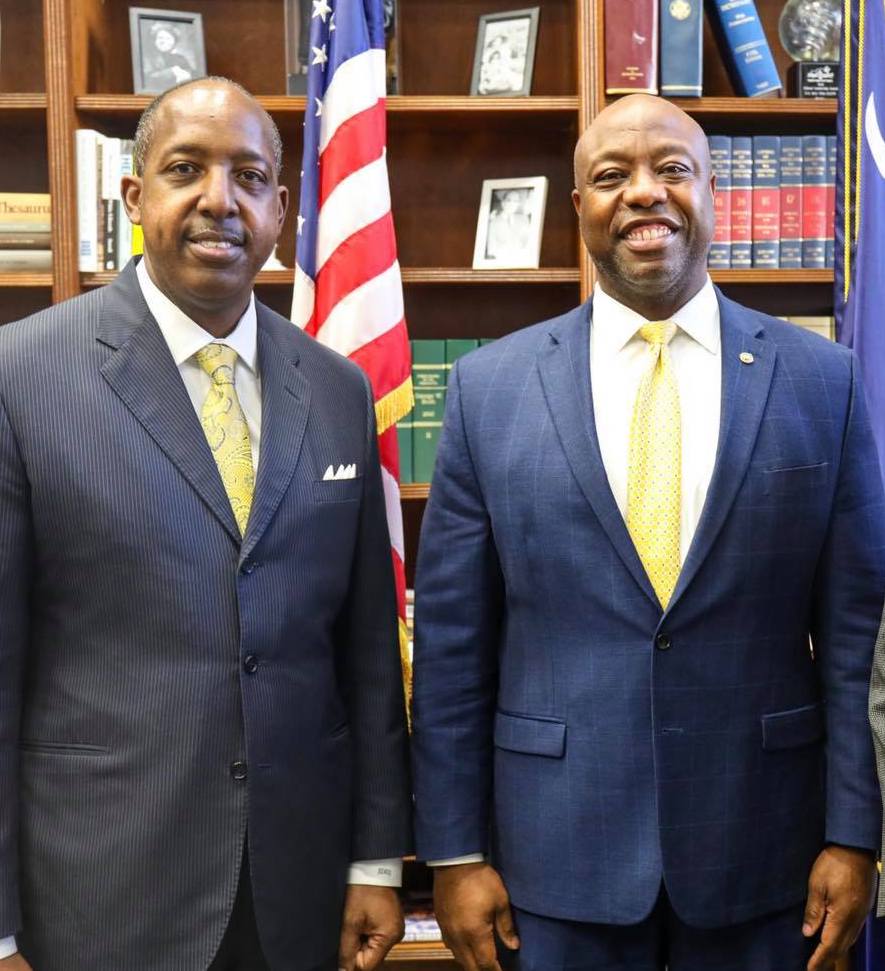A Judicial Misconduct Trifecta
Seeking admonishments for federal judges in South Carolina, Iowa and Texas
Fix the Court filed three complaints against federal judges Tuesday – one formal, two informal – for perceived ethical violations.

The formal complaint, filed under Rule 6 of the Rules for Judicial-Conduct and Judicial-Disability Proceedings, asks Fourth Circuit Chief Judge Roger Gregory to investigate whether D. South Carolina Judge Joseph Dawson (left in photo, with Sen. Tim Scott) violated the Code of Conduct for U.S. Judges by signing a contract that authorizes him to continue to perform work functions for his previous job while he sits on the federal bench.
Dawson received his judicial commission on Dec. 22, 2020, but on Dec. 7 signed a Employment Contract Separation Agreement, which he apparently drafted himself, with his former employer, Charleston Co. (S.C.), where Dawson was County Attorney. Item One, Clause B of the Agreement states Dawson would receive a $216,000 payment for providing “institutional and historical knowledge and insight on proceedings […] for twelve months” post-separation.
Though the lump sum has already been paid out, and the agreement might read like a severance arrangement, it includes language that likely makes it a ongoing employment contract, which is prohibited according to the judiciary’s ethics regulations. (See §1020.35(a): “No covered senior employee shall affiliate with […an] entity to provide professional services which involve a fiduciary relationship for compensation.”) FTC hopes the complaint will lead to the cancellation of the Agreement and an assurance from Dawson that he won’t do County work while sitting as a judge.
“Confirming judges is pretty much all the Senate does nowadays, and I can imagine that many of the 234 judges confirmed under President Trump and those to be confirmed under President Biden have severance agreements with compensation involved,” FTC executive director Gabe Roth said. “Deferred compensation is generally okay, but continued employment is not, so I see this is an opportunity for the judiciary to reassure the American people that these new judges aren’t still beholden to their previous employers when they’re donning their robes.”
“And Judge Dawson is more than welcome to teach part-time or write a book if he wants to earn outside income while on the bench,” Roth added.
That Dawson would receive “a contingency fee in the amount of 1.5% of the gross amount recovered” from the County’s opioid litigation against Purdue Pharma – per the Item One, Clause C of the Agreement – also raises ethical questions. Though deferred income is generally acceptable under ethics regulations, neither the “knowledge and insight” nor the “contingency fee” was noted in Dawson’s Senate Judiciary Questionnaire under sections on “Future Benefits” (Q20) or “Outside Commitments During Court Service” (Q21), nor did Dawson update the Committee of this arrangement to our knowledge.
Also Tuesday, FTC sent a letter to the clerk of the Eighth Circuit to inquire if a formal complaint has been filed against S.D. Iowa Judge Robert Pratt, who on Dec. 29, 2020, told the Associated Press, “It’s not surprising that a criminal like Trump pardons other criminals. […] But apparently to get a pardon, one has to be either a Republican, a convicted child murderer or a turkey.” According to the article, Pratt was referring to pardons granted to Trump’s former campaign operatives, a Republican former U.S. House member and security contractors who were convicted of killing civilians in Iraq.
FTC’s letter notes that a formal complaint may not be necessary so long as Judge Pratt commits to corrective action – e.g., to not making similar prejudicial comments in the future. Both the Fourth and Eighth Circuit clerks acknowledged these complaints – with the Fourth giving ours a docket entry, 04-21-90039 – but neither noted if other complaints related to these incidents have been filed.
FTC’s third action Tuesday arose from a Feb. 3 Texas Lawyer article, which implied that a 2013 complaint filed by an Austin attorney against S.D. Texas Judge Lynn Hughes for making biased and bigoted statements might still be open.
As FTC’s letter points out, Judge Hughes in 2015, 2018 and 2019 allegedly made biased and bigoted comments similar in nature to those made in 2013, so it is possible that the 2013 complaint remains unresolved. The 2019 comments resurfaced last month when a Fifth Circuit panel reversed Hughes’ dismissal of a sex discrimination case in which the judge said he would “crush” the plaintiff.
Either way, FTC believes it is in the public interest to disclose the status of that complaint and any others that may have been filed against Judge Hughes in the intervening years. Should we learn the 2013 complaint has not been adjudicated, further action or a formal complaint might be warranted.
Tuesday was the first time FTC filed a formal complaint against a federal judge. Previously, when FTC discovered an ethics issue, we had emailed the judge directly (e.g., Judge Walker about his $89,500 loan to his law clerk and his unpaid teaching assistant), emailed the circuit executive (e.g., the Tenth Circuit’s Dave Tighe over Judge Martinez’s political donation), emailed the Supreme Court clerk (see this) or passive-aggressively posted a link about it near the end of a press release.